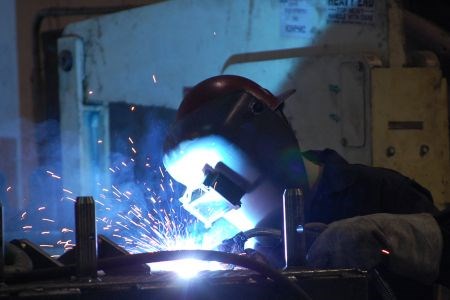Nearly six months after the Canadian and American governments signed an agreement on the Buy American conflict, New Liskeard’s Wabi Iron and Steel Corp. is still feeling the pinch from restricted trade.
With 50 per cent of its manufacturing business stemming from exports, the company is still seeing reduced access to municipal projects in the United States despite provisions in the Buy American deal.
“We have been in a recent situation where a U.S. company had open access to our market, a Canadian municipality, but we don’t have reciprocal access to those same types of markets in the U.S.,” says president Peter Birnie, whose company makes a range of products from castings to skips to mine cages.
“There are examples where the trade agreement is, in our opinion, not necessarily being applied consistently with what we were told at the time of the signing of the agreement. That said, we knew it was an important first step and we need to keep seeing it move forward.”
Further complicating matters for Birnie is that, with many perceiving the agreement as the be-all and end-all solution, public and media discussion of the issue has all but evaporated on what is no longer being seen as a “sexy” issue.
This silence matches the federal overnment’s lack of involvement of people like Birnie, who vocally served as the Canadian Foundry Association’s executive leader on the Buy American negotiations. This flies in the face of comments he received from senior government officials that he would continue to be consulted on the matter as discussions continue to move forward.
“I’m not suggesting it’s not happening, but we need to hear what’s going on to improve things.”
As the international face of Northern Ontario’s political efforts to resolve the issue, North Bay Mayor Vic Fedeli says he’s seen some quiet but crucial progress at the upper levels of the federal government.
Having led the mayor-to-mayor campaign through the heart of the Buy American controversy on behalf of a number of local companies, including bridge-builders Central Welding, Fedeli is still being kept in the loop about developments.
In late June, he was the only politician invited to the United States consulate in Toronto to participate in a video-conference with the six other U.S. consulates scattered throughout Canada.
“The most interesting thing that came from it, which is what we’ve said all along, is very little of the $800 billion of funds that were put in the U.S. stimulus program have actually been spent,” says Fedeli. “This is not unusual, and Canada is the same way, because it takes a lot of time to get these projects shovel-ready.”
The message, he says, is for manufacturers to knock on the doors of American municipalities armed with copies of the agreement struck in February, and inform them the restrictions have been lifted.
It’s a message that was further reinforced when Fedeli met with David Jacobson, the U.S. ambassador to Canada, in mid-July.
This runs contrary to those who said the February agreements were “too little, too late” to create meaningful opportunities for Northern Ontario companies, says Fedeli.
“That’s just politics, and politics is never good for business.”
Despite the U.S. trade issue, the fortunes of Wabi Iron have recovered alongside the state of the greater North American economy over the last 12 months. Without specifying numbers, Birnie says his order book has “substantially improved” through to July of this year over 2009, with clients in the potash, coal, gold, and salt sectors, with enhanced interest in Wabi’s foundry services.
Wabi’s outlook for the next five to six years is such that Birnie anticipates adding another 50 workers to the staff of 120.
His strong optimism for the future is tempered by what he sees as uncompetitive policies, including not only the Buy American concerns, but also Ontario’s “troubling” approach to energy.
With the mining and forestry industries acting as major clients, Birnie is a strong advocate of policies that help improve their viability, which is threatened by the elevated cost of power in the North, he says.
As an example, he points to the May closure of Xstrata’s Kidd Creek Metallurgical Site in Timmins, where one of the prevailing reasons for the move was Ontario’s price of electricity.
Major capital improvements in Ontario will become increasingly less attractive when other jurisdictions like Quebec and Manitoba feature less costly rates, he says. Even the discounted rate of power being offered to Northern Ontario’s industrial players for the next three years is too short a period to be of any real use for companies who plan decades in advance, he adds.
In the same vein, he also assails the province’s use of the feed-in tariff program, which buys power from providers for as much as 10 times more than is being sold back to consumers.
This, he says, is not only unsustainable in the long term but will also require the province to run a deficit, something that will eventually create trickle-down costs for industrial manufacturers such as himself.
“The economy is highly dependent on making something, whether it’s an intellectual product we sell, or actually making a widget, but you have to make something to create wealth,” says Birnie. “Even the service economy survives on manufacturers’ ability to compete in the global marketplace.”




